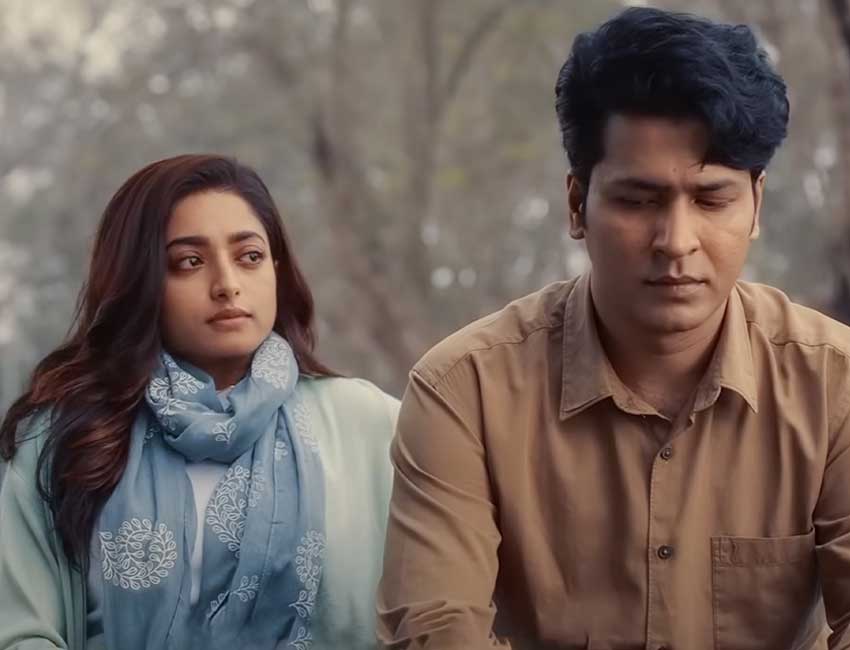Mitthye Premer Gaan: A Haunting Song of Longing and Illusion

Shanku, a devoted film-buff from Silchar, lives and breathes cinema.…
In a hushed meditation on love and frailty, reviewer Shanku Sharma explores why Paroma Neotia’s Mitthye Premer Gaan is a quiet whisper in Bengali cinema.
In the changing landscape of Bengali cinema, where narratives often swing between the raw grittiness of social realism and the glittering grandeur of mainstream entertainers, Mitthye Premer Gaan (2023) arrives like a quiet whisper in a crowded room. Paroma Neotia’s debut feature chooses not to compete with spectacle or noise. Instead, it chooses to slow down, to breathe, and to let emotions find their own rhythm. What emerges is a hushed, melancholic meditation on love, desire, and the ache of human frailty—a film that lingers long after the final frame fades, like the last note of a haunting melody.
The very title, Mitthye Premer Gaan—“The Song of False Love”—offers a prelude to what the film aspires to be. It suggests romance that dazzles but deceives, tenderness that intoxicates but cannot endure. Love here is not triumphant; it is fragile, fleeting, and sometimes illusory. Neotia takes this ephemeral quality of human connection and shapes it into a triangular tale of yearning and heartbreak, one that resists the grand proclamations of traditional romances. Instead of fiery declarations and dramatic crescendos, the film dwells in silences, pauses, and half-spoken words. Love here is not shouted from rooftops—it trembles in a glance, hides in a sigh, and resonates through the music that threads the story together.
The Triangle of Longing
At the heart of Mitthye Premer Gaan are three characters whose lives intertwine in a delicate push and pull of intimacy, desire, and despair. The film rests heavily on the shoulders of its lead actors, and they rise to the occasion with remarkable sensitivity.
Anirban Bhattacharya, one of the most compelling actors of his generation, becomes the brooding soul of the narrative. His performance is not one of external flourish but of inward storms. With restrained gestures, hesitant pauses, and eyes brimming with untold emotions, he embodies a man caught between love and loss, intimacy and distance. His silences speak more than dialogues ever could, drawing viewers into the unarticulated ache of his character.
Ishaa Saha delivers a performance that is both tender and resilient. She brings to the screen a quiet intensity, grounding the film in emotional honesty. Her character is the emotional anchor—the one who feels, absorbs, and carries the weight of unspoken truths. Ishaa balances vulnerability with an inner strength, making her presence indispensable to the narrative. She is not merely a participant in the love triangle—she is its beating heart.
Arjun Chakrabarty plays the catalyst—the one who unsettles the fragile balance of affections. With his natural charm and warmth, he injects both brightness and tension into the story. His entry doesn’t just complicate the plot; it adds shades of unpredictability, making the tale feel lived-in and deeply relatable. He is the character who forces others—and the audience—to confront the precariousness of love and the illusions it sustains.
Around this trio revolves a supporting cast—Soumya Mukherjee, Anusha Viswanathan, Sudipa Bose, Debesh Chattopadhyay, Biswarup Biswas, and Sampritee Ghatak—who ensure that the story never feels isolated within its central romance. Their presence adds texture and depth, reminding us that love stories, however intimate, are always shaped by the people, friendships, and relationships that surround them.
Music as the Soul of the Film
In most films, songs arrive as interludes; in Mitthye Premer Gaan, music is the very soul. The compositions by Kuntal De, Ranajoy Bhattacharjee, and Soumya Rit, with evocative lyrics by Aritra Sengupta, elevate the narrative to a lyrical experience. Each song is less a performance and more an inner monologue, a confession of emotions left unsaid. From haunting ballads to wistful laments, the soundtrack does not interrupt the story—it becomes the story.
The music here works like a diary of the characters’ inner lives. What they cannot articulate in words emerges in melody. At times, the songs soothe; at other times, they wound. But in every instance, they carry the weight of longing, deception, and fragile hope. Rarely has a contemporary Bengali film used music with such organic intimacy, transforming cinema into something close to lived poetry.
Mitthye Premer Gaan – A Director’s Quiet Confidence
For a debut filmmaker, Paroma Neotia shows striking confidence and clarity of vision. She does not rush her storytelling. She does not overwhelm her characters with dramatic flourishes. Instead, she trusts silence. Her gaze is sensitive and compassionate, never indulgent. She allows her frames to linger, her characters to breathe, her silences to stretch until the audience begins to feel the ache themselves.

The cinematography, cloaked in shadows and warm hues, mirrors the inner turbulence of the characters. The visuals are moody, fragile, and often poetic—like candlelight flickering in a dim room. The pacing is unhurried, almost meditative, as if the film invites the audience not to consume a story but to inhabit a feeling.
Mitthye Premer Gaan – More Than a Love Story
At its core, Mitthye Premer Gaan is not simply a tale of romance. It is a reflection on loneliness, on the fragility of human connections, on the illusions we cling to and the truths we are eventually forced to confront. It explores the bittersweet paradox of love—its power to inspire melodies, even as it leaves us in silence. The “false love” of the title does not merely mean deception in relationships; it also speaks to the illusions we create within ourselves, the stories we tell our hearts to keep the ache at bay.
A Whisper in an Age of Noise
Cinema today often feels compelled to shout in order to be heard. Mitthye Premer Gaan dares to do the opposite—it whispers. And in its quietness lies its strength. With soulful music, nuanced performances, and poetic direction, it emerges as one of the most delicate and emotionally resonant entries in recent Bengali cinema.
Like a song discovered on a rainy evening—unexpected, unassuming—it does not demand attention. But once you listen, it refuses to leave. It lingers like memory, like unspoken words, like the ache of love that is both false and true at the same time. A song of illusion, yet one that carries the deepest truths of the human heart.
What's Your Reaction?
Shanku, a devoted film-buff from Silchar, lives and breathes cinema. Movies are his ultimate passion, truly his first love, defining his every waking moment.

